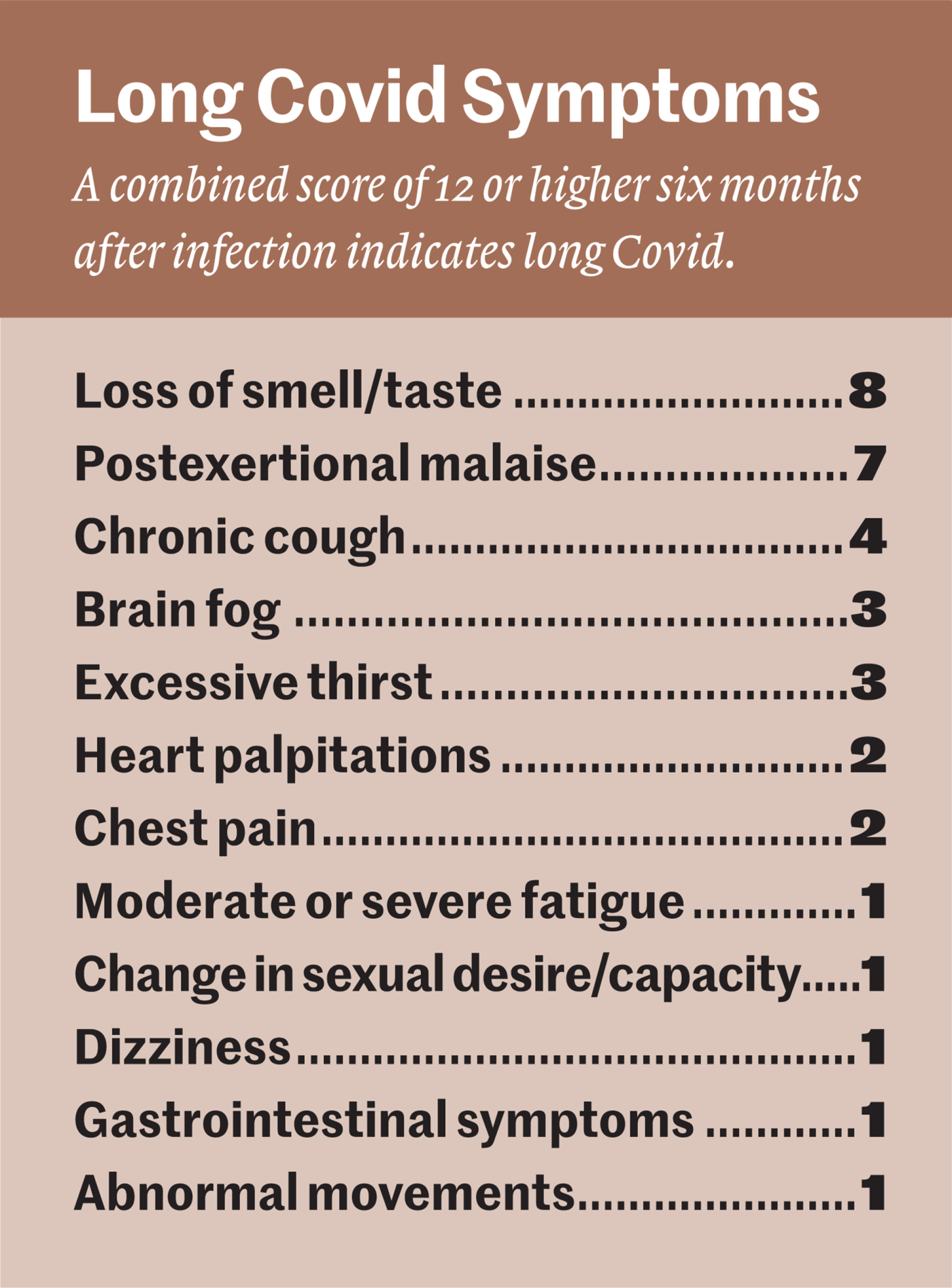
Do You Have Long Covid?
A team of researchers has published a definition and a list of symptoms.
We’ve all heard of long Covid, but what exactly is it? That’s been a conundrum for researchers since the early days of the pandemic.
Tanayott (Tony) Thaweethai ’13 (at left) and Andrea Goldin Foulkes ’94, both biostatisticians at Mass General Hospital, collaborated with the National Institutes of Health RECOVER initiative and a team of researchers (including Beth Karlson ’84 and Emily Levitan ’00) to develop a definition. In a study of 10,000 adults, published in the Journal of the American Medical Association in May, they identified 12 symptoms (right) as hallmarks of long Covid.
BAM contributing editor Stephanie Grace ’87 spoke with Thaweethai and Foulkes about what they learned and where their research will lead next.
What do you set out to show with this research?
THAWEETHAI Lots of people reported experiencing symptoms that just weren’t going away, that were really affecting their quality of life, their physical health or mental health. But there was no clinical consensus about what long Covid is because it appeared to be manifesting in so many different ways. Our goal was to identify the symptoms that strongly differentiated people who did and didn’t have a history of Covid.
So what is the definition?
THAWEETHAI We identified 12 symptoms and assigned scores to each. Some people have symptoms that are related to fatigue, some people have symptoms related to cardiac or respiratory problems. The message is that long Covid doesn’t look the same in everyone
But that doesn’t mean these are all the possible symptoms, right?

FOULKES One thing we realized is that there are a lot of symptoms that don’t fall into that top group. For example, a lot of patients experience headaches, and from the patient perspective that may be one of the symptoms that’s most bothersome. Although we identified these 12 symptoms, there are many, many more that patients are experiencing. These are the ones where you can discriminate between people who have a history of infection and those who don’t.
The goal was to create an opportunity for more research. By identifying individuals that we feel fairly sure have long Covid, we can start looking at: What are the mechanisms? Why is it that these individuals got long Covid? What’s under the hood that explains their illness? And, importantly, what are the determinants of recovery?
Does long Covid last a certain period of time? Is it temporary or permanent?
FOULKES The jury’s still out. We did find that among individuals who met the symptom-based criteria for long Covid at six months, about a third no longer did at nine months. But what we don’t know is whether the symptoms will resurface. We’re still trying to get a handle on the longer-term
trajectories.
Where else does this research point you?
THAWEETHAI I think it positions us to further interrogate the role of comorbidities. Also, there’s a lot of ongoing research looking at social determinants of health and how they may impact the likelihood that someone develops long Covid.
FOULKES Within the observational cohort that we’re involved with, there are select groups of individuals that are going through much more invasive testing; they’re receiving MRIs, CT scans, colonoscopies—additional tests that we’re hoping will shed light on the mechanisms of disease. Ultimately, the goal is to identify therapeutics as well as preventive measures.
Any other takeaways?
FOULKES I would emphasize that, although this tool was developed to identify people with long Covid, it was not intended to determine that somebody doesn’t have long Covid. There may be individuals that don’t meet the score-based criteria but still have long Covid.
THAWEETHAI One of the symptoms that was found to be most strongly associated with having been infected was postexertional malaise, feeling extremely exhausted after a minor physical or mental effort. This type of fatigue can be really debilitating; you can be confined to your bed for a day or longer after doing something that in your prior life was nothing.
For Covid skeptics, I think this list confirms what a lot of people who are experiencing long Covid are going through, that it’s not in their heads.




